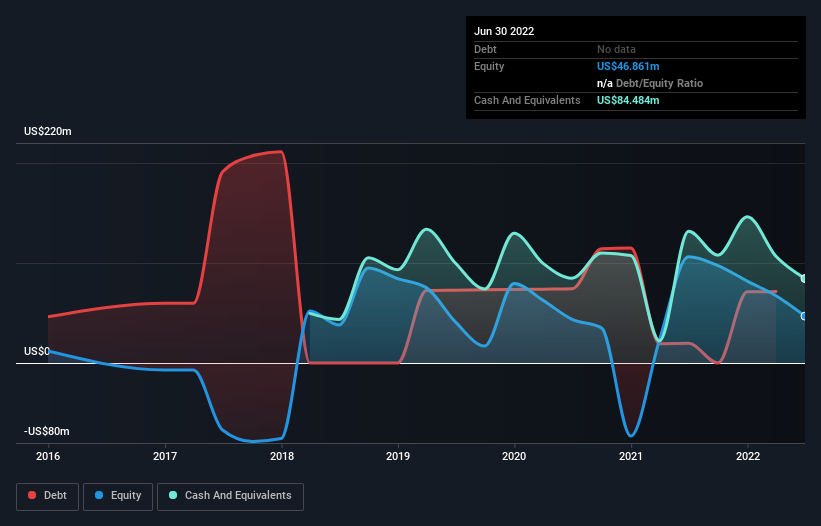
David Iben put it well when he said, 'Volatility is not a risk we care about. What we care about is avoiding the permanent loss of capital.' So it might be obvious that you need to consider debt, when you think about how risky any given stock is, because too much debt can sink a company. We can see that Evolus, Inc. (NASDAQ:EOLS) does use debt in its business. But should shareholders be worried about its use of debt?
What Risk Does Debt Bring?
Generally speaking, debt only becomes a real problem when a company can't easily pay it off, either by raising capital or with its own cash flow. Ultimately, if the company can't fulfill its legal obligations to repay debt, shareholders could walk away with nothing. However, a more usual (but still expensive) situation is where a company must dilute shareholders at a cheap share price simply to get debt under control. Of course, the upside of debt is that it often represents cheap capital, especially when it replaces dilution in a company with the ability to reinvest at high rates of return. The first step when considering a company's debt levels is to consider its cash and debt together.
View our latest analysis for Evolus
What Is Evolus's Debt?
The image below, which you can click on for greater detail, shows that at June 2022 Evolus had debt of US$71.4m, up from US$19.6m in one year. But it also has US$84.5m in cash to offset that, meaning it has US$13.1m net cash.

A Look At Evolus' Liabilities
We can see from the most recent balance sheet that Evolus had liabilities of US$51.5m falling due within a year, and liabilities of US$112.5m due beyond that. On the other hand, it had cash of US$84.5m and US$21.0m worth of receivables due within a year. So it has liabilities totalling US$58.5m more than its cash and near-term receivables, combined.
Since publicly traded Evolus shares are worth a total of US$537.4m, it seems unlikely that this level of liabilities would be a major threat. Having said that, it's clear that we should continue to monitor its balance sheet, lest it change for the worse. Despite its noteworthy liabilities, Evolus boasts net cash, so it's fair to say it does not have a heavy debt load! There's no doubt that we learn most about debt from the balance sheet. But ultimately the future profitability of the business will decide if Evolus can strengthen its balance sheet over time. So if you want to see what the professionals think, you might find this free report on analyst profit forecasts to be interesting.
Over 12 months, Evolus reported revenue of US$132m, which is a gain of 73%, although it did not report any earnings before interest and tax. Shareholders probably have their fingers crossed that it can grow its way to profits.
So How Risky Is Evolus?
By their very nature companies that are losing money are more risky than those with a long history of profitability. And we do note that Evolus had an earnings before interest and tax (EBIT) loss, over the last year. Indeed, in that time it burnt through US$100m of cash and made a loss of US$79m. Given it only has net cash of US$13.1m, the company may need to raise more capital if it doesn't reach break-even soon. With very solid revenue growth in the last year, Evolus may be on a path to profitability. Pre-profit companies are often risky, but they can also offer great rewards. The balance sheet is clearly the area to focus on when you are analysing debt. However, not all investment risk resides within the balance sheet - far from it. We've identified 3 warning signs with Evolus , and understanding them should be part of your investment process.
When all is said and done, sometimes its easier to focus on companies that don't even need debt. Readers can access a list of growth stocks with zero net debt 100% free, right now.
If you're looking to trade Evolus, open an account with the lowest-cost platform trusted by professionals, Interactive Brokers.
With clients in over 200 countries and territories, and access to 160 markets, IBKR lets you trade stocks, options, futures, forex, bonds and funds from a single integrated account.
Enjoy no hidden fees, no account minimums, and FX conversion rates as low as 0.03%, far better than what most brokers offer.
Sponsored ContentValuation is complex, but we're here to simplify it.
Discover if Evolus might be undervalued or overvalued with our detailed analysis, featuring fair value estimates, potential risks, dividends, insider trades, and its financial condition.
Access Free AnalysisHave feedback on this article? Concerned about the content? Get in touch with us directly. Alternatively, email editorial-team (at) simplywallst.com.
This article by Simply Wall St is general in nature. We provide commentary based on historical data and analyst forecasts only using an unbiased methodology and our articles are not intended to be financial advice. It does not constitute a recommendation to buy or sell any stock, and does not take account of your objectives, or your financial situation. We aim to bring you long-term focused analysis driven by fundamental data. Note that our analysis may not factor in the latest price-sensitive company announcements or qualitative material. Simply Wall St has no position in any stocks mentioned.
About NasdaqGM:EOLS
Evolus
A performance beauty company, delivers products in the cash-pay aesthetic market in the United States, Canada, Europe, and Australia.
Very undervalued with exceptional growth potential.
Similar Companies
Market Insights
Community Narratives



